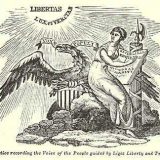…según el cual, en este país germano aún quedan mentes despiertas. No todos están sumidos en el letargo socialdemócrata, ocupados con las pelusillas de su ombligo europeo. Como no tiene desperdicio lo cuelgo entero.
By Claus Christian Malzahn in BerlinGermany loves to criticize US President George W.
Bush’s Middle East policies — just like Germany loved to criticize former President Ronald Reagan. But Reagan, when he demanded that Gorbachev remove the Berlin Wall, turned out to be right. Could history repeat itself?
Quick quiz. He was re-elected as president of the United States despite being largely disliked in the world — particularly in Europe. The Europeans considered him to be a war-mongerer and liked to accuse him of allowing his deep religious beliefs to become the motor behind his foreign policy. Easy right?
Actually, the answer isn’t as obvious as it might seem. President Ronald Reagan’s visit to Berlin in 1987 was, in many respects, very similar to President George W. Bush’s visit to Mainz on Wednesday. Like Bush’s visit, Reagan’s trip was likewise accompanied by unprecedented security precautions. A handpicked crowd cheered Reagan in front of the Brandenburg Gate while large parts of the Berlin subway system were shut down. And the Germany Reagan was traveling in, much like today’s Germany, was very skeptical of the American president and his foreign policy. When Reagan stood before the Brandenburg Gate — and the Berlin Wall — and demanded that Gorbachev «tear down this Wall,» he was lampooned the next day on the editorial pages. He is a dreamer, wrote commentators. Realpolitik looks different.
But history has shown that it wasn’t Reagan who was the dreamer as he voiced his demand. Rather, it was German politicians who were lacking in imagination — a group who in 1987 couldn’t imagine that there might be an alternative to a divided Germany. Those who spoke of reunification were labelled as nationalists and the entire German left was completely uninterested in a unified Germany.
When George W. Bush requests that Chancellor Schroeder — who, by the way, was also not entirely complimentary of Reagan’s 1987 speech — and Germany become more engaged in the Middle East, everybody on the German side will nod affably. But despite all of the sugar coating the trans-Atlantic relationship has received in recent days, Germany’s foreign policy depends on differentiating itself from the United States. And when Bush leaves Europe, the differences will remain. Indeed, Bush’s idea of a Middle Eastern democracy imported at the tip of a bayonet is, for Schroeder’s Social Democratic Party and his coalition partner the Green Party, the hysterical offspring off the American neo-cons. Even German conservatives find the idea that Arabic countries could transform themselves into enlightened democracies somewhat absurd.
This, in fact, is likely the largest point of disagreement between Europe and the United States — and one that a President John Kerry likely would not have made smaller: Europeans today — just like the Europeans of 1987 — cannot imagine that the world might change. Maybe we don’t want the world to change, because change can, of course, be dangerous. But in a country of immigrants like the United States, one actually pushes for change. In Mainz today, the stagnant Europeans came face to face with the dynamic Americans. We Europeans always want to have the world from yesterday, whereas the Americans strive for the world of tomorrow.
During the Cold War, these differences were covered up by clearly shared security and political interests; now, the gaps are becoming visible. The two continents will continue to drift apart despite all of the smiles exchanged today in Mainz, yesterday in Brussels and tomorrow in Bratislava. It was difficult not to cringe during Reagan’s speech in 1987. He didn’t leave a single Berlin cliché out of his script. At the end of it, most experts agreed that his demand for the removal of the Wall was inopportune, utopian and crazy.
Yet three years later, East Germany had disappeared from the map. Gorbachev had a lot to do with it, but it was the East Germans who played the larger role. When analysts are confronted by real people, amazing things can happen. And maybe history can repeat itself. Maybe the people of Syria, Iran or Jordan will get the idea in their heads to free themselves from their oppressive regimes just as the East Germans did. When the voter turnout in Iraq recently exceeded that of many Western nations, the chorus of critique from Iraq alarmists was, at least for a couple of days, quieted. Just as quiet as the chorus of Germany experts on the night of Nov. 9, 1989 when the Wall fell.Just a thought for Old Europe to chew on: Bush might be right, just like Reagan was then.
La referencia ésta
El soplo vino de un demonio de la guarda que suele andar por aquí.




